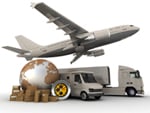
Houston crating and shipping to Guinea can feel like a real challenge. When you first start packing things up, you might have plenty of questions. Pack N Send can help! Contact us with all of your international shipping questions. If you're shipping to Guinea, start by checking out the information below.
There are a few things that should not be shipped in and out of Guinea. If your items fall under this list, you shouldn't attempt to ship them. These prohibitions, according to the USPS website, are as follows:
Prohibited items (that is, items that should not be shipped to Guinea:
- Arms (that is, guns of any type), ammunition, daggers, sword-canes, brass knuckles, blackjacks, and other "secret weapons"--so anything in which a weapon is concealed is off-limits.
- Anything that has the "Red Cross" or "Geneva Cross" on it
- Money: coins, banknotes, currency notes, etc. This includes traveler's checks and securities payable to bearer.
- Precious metals: gold, silver, platinum (manufactured and natural)
- Precious stones, jewels, and other valuable artifacts. In essence, these last three items indicate that nothing of any ready monetary value should be shipped into Guinea.
- Any products that give the impression that they were created or put together in France. This includes any labels on the item, wrappings on the item, or markings on the item itself. Guinea is coming out highly against supporting France. This includes both natural and manufactured items.
- "Perishable infectious biological substances."
- Radioactive material
- Weights and measures designed for anything but the metric system (no pounds and inches here!)
Guinea also has a few very particular regulations concerning items shipped into the country. Study these items carefully before attempting to ship anything in and out of Guinea.
- Any products coming from a place that has the same name as a place in France (so anything that might even sound like it comes from a place in France) must be labeled not only with the name of the place, but also with the name of the country. It must also have the word "imported" clearly visible on the product.
- Tinned vegetables, fish, and plums are required to have the country of origin imprinted, not only in ink, but in letters that are either raised or lowered at least four millimeters. They must be in the middle of the lid and on the bottom, in a space that has been devoted entirely to that purpose--no other inscriptions should be in the same space. The cases and wrappers in which these products appear should be labeled by the country of origin.
Did You Know?
- Guinea's official native language is French, but some subgroups within the area--including the Fula, Mandingo, and Susa--speak languages of their own.
- Guinea has a hot, dry climate. From June to November, they experience monsoons; from December to May, the climate remains hot, dry, and windy.
- Guinea has a rich ecosystem that includes rain forests and incredible wildlife in the south. It's a beautiful area.
- The capital city of Guinea is Conakry.
- Guinea has a rich selection of natural resources including several large mineral deposits, rich agricultural potential, and hydroelectric power sources. It is the second-largest producer of bauxite.
- Guinea was originally held by France. It gained its independence on October 2, 1958, and has celebrated this day as National Day of the Republic of Guinea every year since.
- Guinea has a very low literacy rate that is countered by the rich musical tradition that can be found there. Music is used in many cultures as a source of sharing information, particularly information that will need to be repeated later. Information set to music is much easier to remember and much more likely to stick in a person's head, particularly if they have trained themselves to remember in that
- way.
Remember, if you have any questions about shipping into Guinea, Pack N Send can help. We provide shipping services that will help get your package where you want it to go.






 We pick up & deliver worldwide, as well as in our backyard.
We pick up & deliver worldwide, as well as in our backyard.